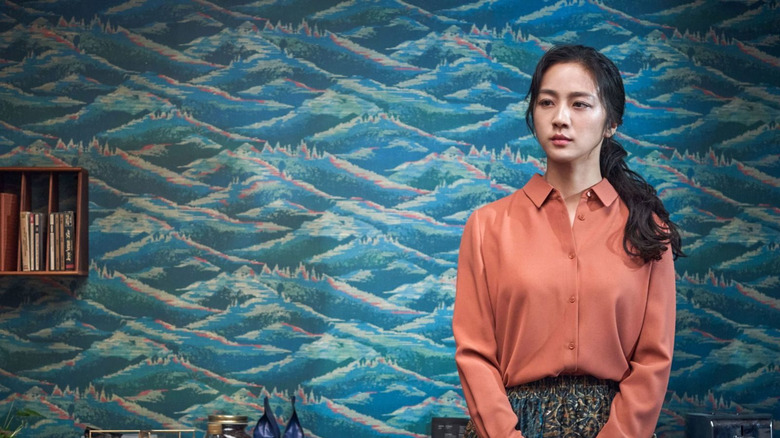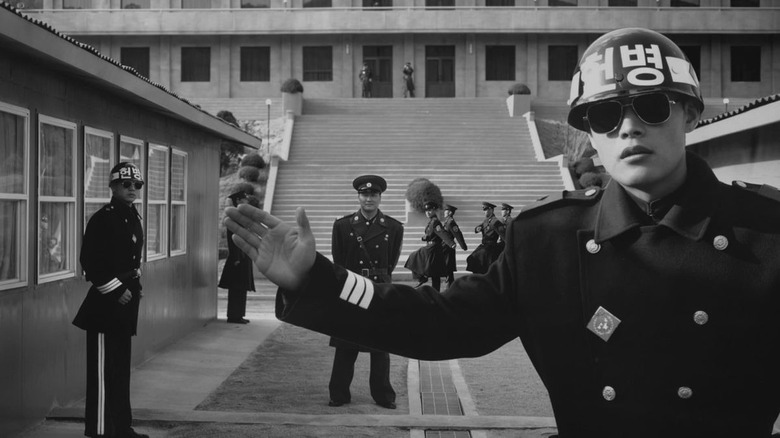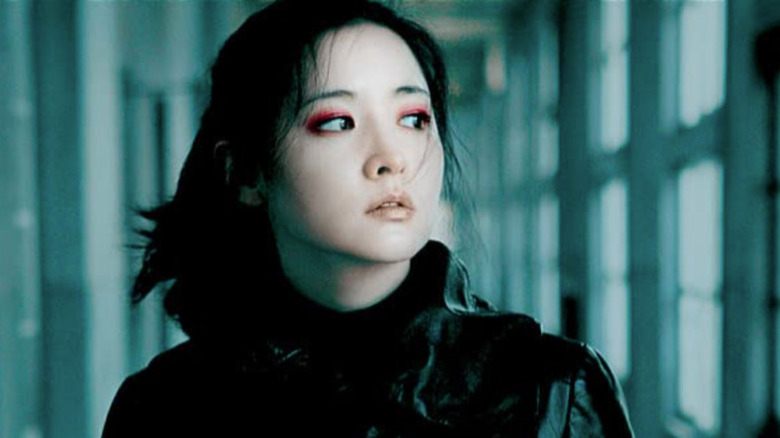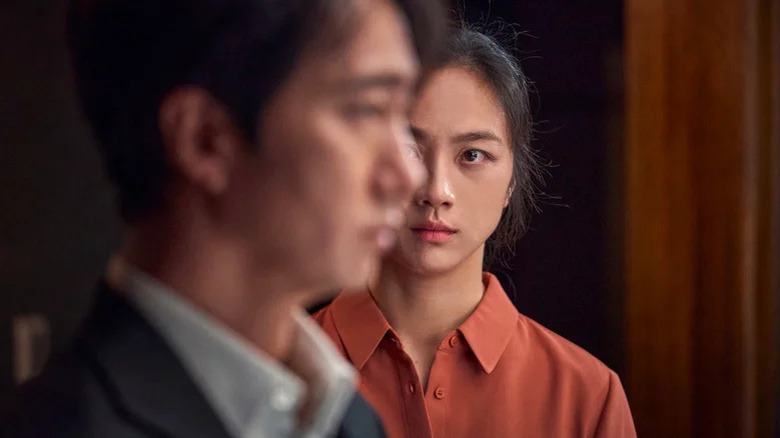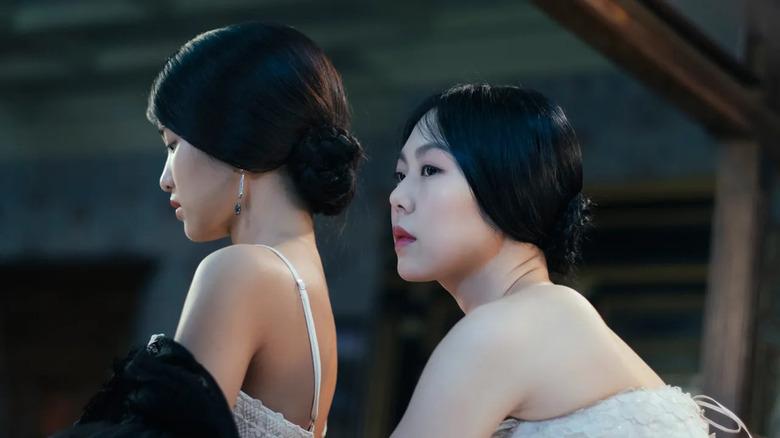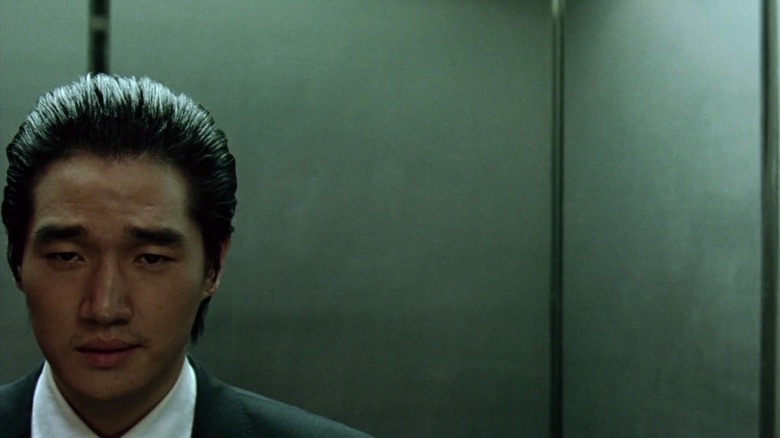The 5 Best Park Chan-Wook Movies, Ranked
South Korean filmmaker Park Chan-wook is the latest auteur making the migration to television. He previously dabbled in serialized narratives by directing all six episodes of the 2018 BBC spy thriller mini-series "The Little Drummer Girl." Adapting a John Le Carré novel, famous for their intricate plots, for his second English-language work? Park's pulled off that and more.
More recently, Park co-created "The Sympathizer," a Vietnam War satire starring Robert Downey Jr. and Hoa Xuande. Adapted from Viet Thanh Nguyen's 2015 novel (and Pulitzer winner), Park also directed the series' first three episodes. Most recently, it's been confirmed that he's producing a TV remake of his most famous film: 2003 revenge thriller "Oldboy."
Park is one of the most internationally known filmmakers from South Korea. The country has a thriving movie industry. (Check out /Film's picks for the best South Korean film directors here.) Before Park took off as a director, he worked for a time as a film critic, telling the A.V. Club in 2009 it was a pay-the-bills sort of job (oh how I long for the days when criticism was such a stable career). While his 1990s films languish in obscurity (to the point of never officially making it stateside), Park's career exploded in the 2000s and he hasn't looked back.
To see why Park has accumulated a sterling reputation, here are the best products of his decades-long filmmaking career. Spoilers follow.
5. Joint Security Area
Park's breakout hit is also his most specifically Korean film — but don't think you can't enjoy it as a cultural outsider. "Joint Security Area" is set in the Korean Demilitarized Zone (DMZ) on the border of the North and South, and the film is about the divide. Two North Korean soldiers are found dead after a firefight; United Nations investigator Major Sophie Jean (Lee Young-ae) is sent to piece together the incident.
By starting at this point, the film tricks the audience into thinking it will be a mystery, with Major Jean at the helm putting together all the clues. Instead, it delivers the answer to its audience: South Korean soldier Lee Soo-hyuk (Lee Byung-hun) had stumbled across the border during a patrol and tripped a landmine. Two North Korean soldiers (Song Kang-ho and Shin Ha-kyun) found and rescued him. The group became friends, with Lee sneaking to the North side to spend time with them. The disaster struck when a North Korean sergeant walked in on one of their get-togethers.
The non-chronological structure serves to hook the audience with the promise of a conspiracy, then surprises them with how innocent it all was. The story recalls the real Christmas Truce of 1914 (when soldiers fighting on opposite sides in World War 1 ceased fighting and celebrated together), another reminder that the citizens of warring nations share common humanity.
4. Lady Vengeance
Park's first claim to fame among international cinephiles is his thematic "Vengeance Trilogy," a triptych of Korean-set revenge thrillers. Part three is 2005's "Lady Vengeance," a feminist thriller in the vein of "Kill Bill." Lee Geum-ja (Lee Young-ae) has recently been released from prison — she was incarcerated for murdering a five-year-old 13 years prior. Though she confessed, she's innocent; the real killer Baek Han-sang (Choi Min-sik) had kidnapped her daughter and blackmailed into taking the blame. Free after playing the part of a model prisoner, she's out to avenge herself.
"Lady Vengeance" treks the same dredges as the other "Vengeance Trilogy" films; the villain is a serial killer of children. Park's films are as famous for their black comedy as their violence, though. "Lady Vengeance" is one of his funniest, particularly the scenes of Geum-ja surviving her time in prison.
It's also the only chapter of the trilogy with room for a potential happy ending. Geum-ja's goal is not only to bring down Mr. Baek, but to reunite with her since-adopted daughter Jenny (Kwon Yea-young). Unlike many other revenge thrillers, the anti-hero has a goal of what they will do once their mission is over. When she's released from prison, Geum-ja is offered a customary tofu cake (the white color representing purity); she only enjoys such a cake (with Jenny) after her vengeance is complete.
Can any soul be as pure as white after choosing to partake in such bloody business, though? Without getting into specific spoilers, "Lady Vengeance" concludes in Agatha Christie-style fashion about how the only difference between an act of justice and vengeance is how many condone it.
3. Decision to Leave
Park outdid himself with his most recent film, 2022's "Decision to Leave" (read our review here), the closest he's ever gotten to an Old Hollywood Noir. (There's a lot of Alfred Hitchcock's "Vertigo" running through the movie.)
Jang Hae-jun (Park Hae-il) is a South Korean detective in Busan, and an insomniac and workaholic to boot. His latest case is investigating the death of a mountain climber who fell to his death. Before ruling it as a mere accident, Hae-jun investigates the man's widow Song Seo-rae (Tang Wei). As he observes her more, he falls in love with her (voyeurism is another Hitchcock flourish), a turn of events that can only lead to disaster.
Park co-wrote with his frequent screenwriting partner Jeong Seo-kyeong (the partnership began on "Lady Vengeance"). "Decision to Leave" is their saddest film. Park's movies have explored romance before, but here, he zeroes in on the melancholic emotions of yearning for someone else to complete you. It's all the more aching since, unlike some other noir characters, Hae-jun is not a simple fool led along on an invisible leash of lust. Tang Wei wears an inscrutable mask when she needs to, but Seo-rae gradually shows she is no uncaring femme fatale.
The undersung (by the Oscars, anyway) star of the picture is cinematographer Kim Ji-yong. Favoring a blue-green color palette (the color of forlorn love), he carefully crafts layered images. Take the interrogation scene, where Hae-jun and Seo-rae's reflections echo them, reflecting how each one is concealing something deeper. Park described it to Vanity Fair as the moment where the detective story and love story meld into one.
2. The Handmaiden
If you liked this year's "Love Lies Bleeding" (read /Film's review here), then Park's 2016 period thriller "The Handmaiden" will probably be your speed too. Both films are about lesbian lovers tearing down systems of patriarchy to get their happy ending.
The movie adapts Sarah Waters' novel "Fingersmith," but moves the setting from Victorian England to early 20th century Korea (when the country was a protectorate of Imperial Japan). The themes of locked-in social class (the villain Kouzuki, played by Cho Jin-woong, aspires to be a Japanese nobleman) and sexuality bulging out from societal repression still feel Victorian, though.
Told in three parts, "The Handmaiden" follows Sook-hee (Kim Tae-ri), a new maid sent to Kouzuki's estate to act as maid to his niece, Lady Izumi Hideko (Kim Min-hee). In truth, Sook-hee is in league with con man "Count" Fujiwara (Ha Jung-woo), who plans to marry Hideko to usurp Kouzuki's fortune.
"The Handmaiden" unfolds in slow motion with twists within twists, and schemes within schemes. Every twist resets the chess board while being more jaw-dropping than the last, replaying previous scenes to make them even more audacious and riotously funny than before. Without any of the dark backdrop in the "Vengeance Trilogy," "The Handmaiden" is Park letting loose his black comedy instincts to whip up a perverse good time. I promise that you'll enjoy such a time.
1. Oldboy
There's no other choice. "Oldboy," the second chapter of the "Vengeance Trilogy," rocketed Park to fame and remains his defining film. Steven Spielberg has "Jaws," David Fincher has "Fight Club," and Park Chan-wook has "Oldboy."
Oh Dae-su (Choi Min-sik) is a middling, drunken businessman who spends 15 years locked in a hotel room. Released for reasons as mysterious as why he was abducted in the first place, he sets out to find the man who imprisoned him and take his revenge. The film is a double-sided revenge thriller; Oh Dae-su is seeking to avenge the stolen years of his life, but the man who stole them, Lee Woo-Jin (Yoo Ji-tae), isn't satisfied with taking only 15 years. Once the film finishes, we understand how Oh Dae-su took a path playing into Lee's sinister plans for him and his new girlfriend, Mi-do (Kang Hye-jung).
"Oldboy" is adapted from a Japanese manga by Garon Tsuchiya and Nobuaki Minegishi, but it takes only the initial premise and early chapters. Park's film surpasses the meandering source material, with a tighter narrative, a more boundary-pushing twist, and bloodier action. Park has said before that he is baring and wrestling the anger in his soul with how violent his films can get. There's no better demonstration of how he keeps us transfixed on that ugliness than "Oldboy."
